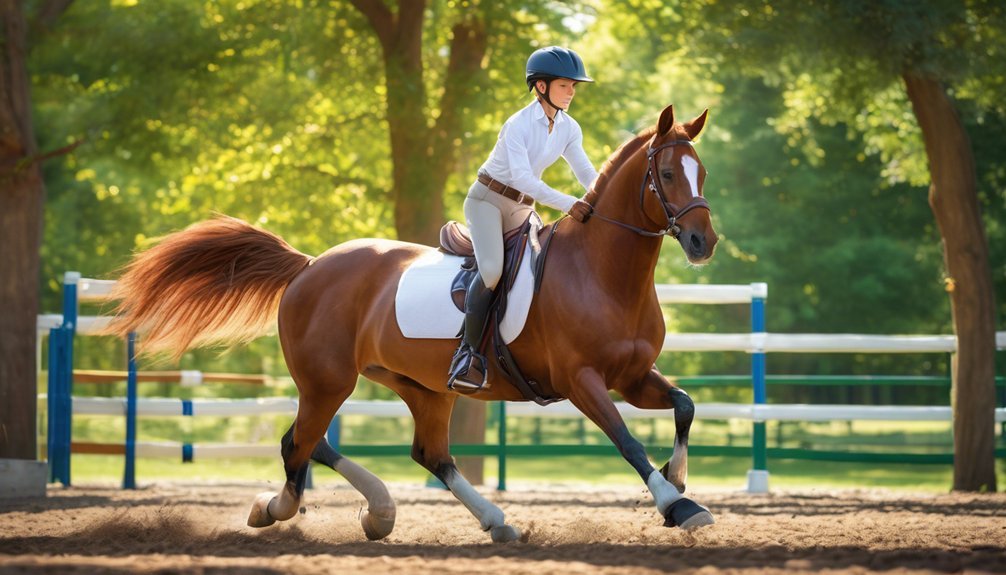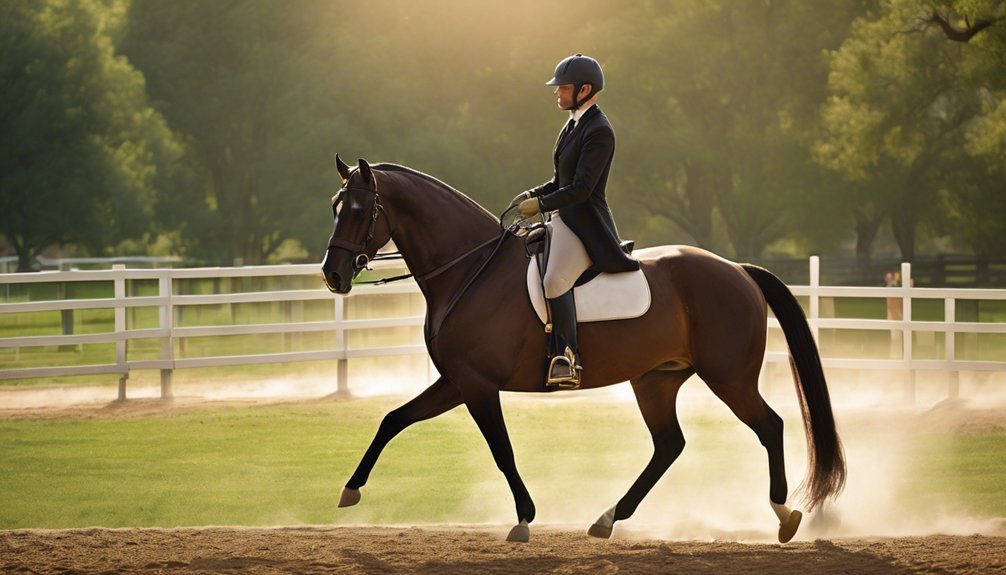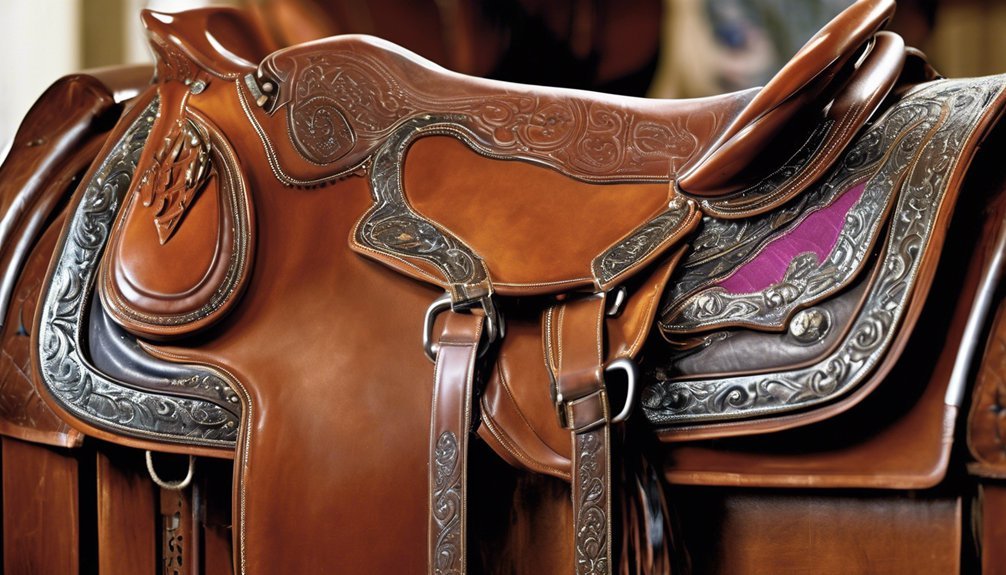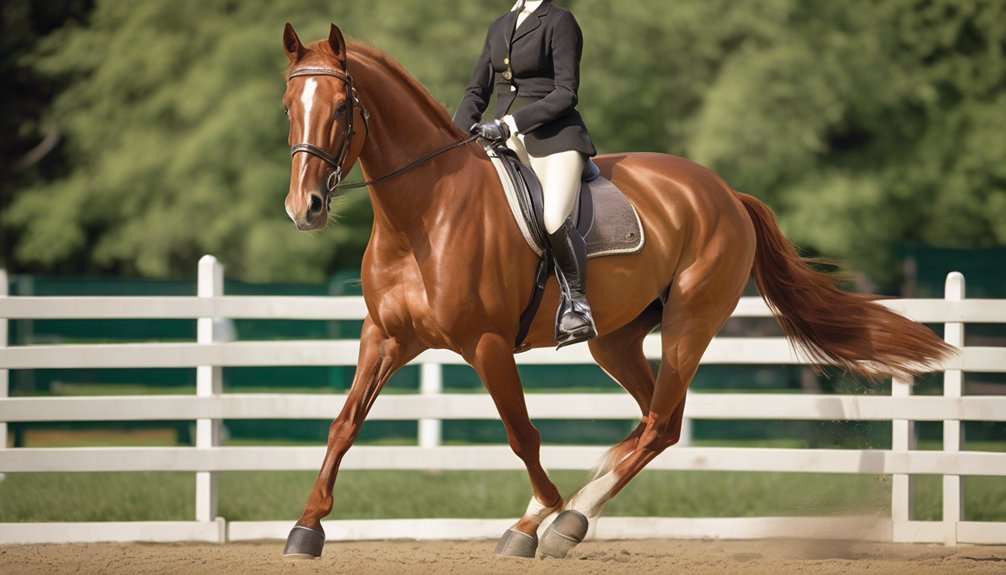
Training a young horse for the show ring requires a methodical approach that balances groundwork and trust-building. You'll need to start with basic commands to establish communication and then focus on grooming for presentation. Desensitization exercises will help prepare your horse for the show environment. As you progress, it's essential to address common challenges and maintain your horse's well-being. Understanding these elements will set the stage for success in the ring. What's the next step?
Key Takeaways
- Start with groundwork to build respect, balance, and trust before introducing show ring training.
- Regularly practice basic commands to enhance cue recognition and responsiveness in the ring.
- Focus on grooming techniques to ensure your horse looks its best for the show.
- Familiarize your horse with the show environment to reduce anxiety and improve performance.
- Maintain a calm demeanor and positive reinforcement to nurture confidence during training sessions.
Understanding Your Young Horse's Behavior

Understanding your young horse's behavior is crucial for effective training. Pay attention to the behavioral signs your horse displays; they're key to interpreting horse communication.
Is your horse's head held high or low? Are their ears flicking back and forth? Each movement speaks volumes about their emotional state. When you recognize these signs, you can respond appropriately, fostering trust and connection.
A calm demeanor encourages your young horse to feel secure, enhancing your training sessions. Remember, it's all about building a relationship based on understanding.
Establishing a Solid Groundwork Foundation
Creating a solid groundwork foundation is essential for your young horse's training success, as it sets the stage for all future work. Begin by incorporating simple groundwork exercises that develop respect, responsiveness, and balance. You'll need essential equipment like a halter, lead rope, and a round pen to facilitate these sessions.
| Groundwork Exercise | Purpose |
|---|---|
| Leading | Establishes respect |
| Lunging | Builds balance |
| Desensitization | Reduces fear |
As you practice, remember that consistency and patience are key. Celebrate small victories together; they'll deepen your bond and prepare your young horse for the challenges ahead. You're creating a partnership that will thrive in the show ring!
Building Trust and Confidence
As you progress in your training, building trust and confidence becomes crucial for your young horse's development.
Start with consistent handling; approach your horse calmly and speak softly to create a safe space. Use positive reinforcement—praise and treats—to encourage trust building.
Remember, every interaction counts; be patient and attentive, allowing your horse to explore its environment at its own pace. Introduce new experiences gradually, ensuring they're manageable.
This confidence boosting process helps your horse learn how to cope with unfamiliar situations. Regular, short sessions keep your training engaging and help solidify that bond.
As trust grows, so will your horse's willingness to learn and perform, setting a strong foundation for a successful partnership in the show ring.
Introducing Basic Commands and Cues

Once you've established trust, it's time to introduce basic commands and cues that will form the backbone of your horse's training.
Teaching your horse basic voice commands will enhance cue recognition and create a stronger bond between you. Here are three essential commands to start with:
- Walk: Use a clear, firm voice command like "walk" while gently nudging your horse forward.
- Stop: Say "whoa" in a calm tone as you apply slight pressure on the reins; consistency is key.
- Turn: Utilize a combination of voice and body cues, like saying "turn" while guiding your horse with your leg and reins.
Practice these commands regularly, and soon, your horse will respond with confidence, making your journey together even more rewarding.
Progressing to Under-Saddle Training
With your horse responding well to basic commands, it's time to introduce under-saddle training, which is vital for developing your horse's riding skills.
Start by familiarizing your horse with the saddle and bridle, ensuring comfort before mounting. Utilize effective under saddle techniques, like gradual pressure and release, to enhance rider communication.
Begin with short sessions, focusing on maintaining a relaxed posture and steady rhythm. Encourage your horse to respond to your cues, reinforcing positive behaviors with praise.
As you progress, practice transitions between gaits to build confidence and responsiveness. This foundation not only strengthens your bond but also prepares your horse for more advanced training.
Together, you'll create a harmonious partnership ready for the show ring!
Developing a Consistent Training Routine
Establishing a consistent training routine is essential for your young horse's development and success. A well-structured plan not only enhances skills but also builds trust between you and your horse.
Here are three key strategies to implement:
- Determine Training Frequency: Aim for regular sessions, ideally 4-5 times a week, to reinforce learning without overwhelming your horse.
- Incorporate Routine Flexibility: Be prepared to adjust your schedule based on your horse's needs and progress. This ensures both mental and physical well-being.
- Set Clear Goals: Establish short-term and long-term objectives for each training phase, helping track progress and maintain motivation.
Socialization and Exposure to New Environments

Consistent training routines lay the groundwork for your horse's development, but equally important is socialization and exposure to new environments.
To create a well-rounded horse, you need to prioritize environmental desensitization. Introduce your horse to various sights, sounds, and experiences in a controlled manner. Start with low-stress environments and gradually increase the complexity as your horse gains confidence.
Encourage positive social interactions with other horses and people. This helps your horse learn appropriate behaviors and builds their trust in you.
Attend local events or training sessions to expose your horse to different settings, reinforcing their adaptability. Remember, each new experience is an opportunity for growth.
Addressing Common Training Challenges
Although training a young horse can be rewarding, you may encounter common challenges that can hinder progress. Addressing these issues head-on is essential for success.
Here are three key areas to focus on:
- Overcoming Fear: Recognize your horse's fears and introduce new experiences gradually. Use positive reinforcement to build confidence.
- Managing Distractions: Train in a controlled environment initially, then gradually introduce distractions. This helps your horse learn to focus on you amidst chaos.
- Consistency in Training: Establish a routine to create a sense of security. Regular practice not only reinforces learning but also strengthens your bond.
Preparing for the Show Ring: The Final Touches
As you prepare your young horse for the show ring, it's crucial to focus on the final touches that can make a significant difference in performance and presentation. Mastering final grooming techniques and understanding show ring etiquette will set you apart.
| Final Grooming Techniques | Show Ring Etiquette | Tips for Success |
|---|---|---|
| Clean hooves | Enter calmly | Breathe and relax |
| Polish coat | Maintain space | Smile and engage |
| Neat mane and tail | Follow the judge's cues | Practice often |
| Proper tack cleaning | Acknowledge others | Stay positive |
Maintaining Your Horse's Physical and Mental Well-being
To ensure your young horse thrives both physically and mentally, it's essential to establish a routine that addresses their overall well-being.
Focus on these key aspects:
- Nutrition Management: Provide a balanced diet tailored to your horse's needs, ensuring they're getting the right nutrients for growth and energy.
- Regular Exercise: Incorporate varied training sessions to build strength and stamina, but also allow for downtime to prevent burnout.
- Stress Reduction: Create a calm environment through consistent handling and exposure to different stimuli.
Use techniques like groundwork to build confidence.
Frequently Asked Questions
What Age Is Ideal to Start Training a Young Horse?
The ideal age to start training a young horse usually falls between two to three years. At this stage, they reach key age milestones and show training readiness, setting the foundation for future success and harmony.
How Long Should Each Training Session Last?
Think of training sessions like a well-timed race; each should last 30 to 60 minutes. Balance session duration with training frequency to maintain focus and energy, ensuring your young horse thrives throughout the process.
Can I Train My Horse Alone or Need Assistance?
You can train your horse solo, but professional help's invaluable. Balancing independence with expert guidance boosts your confidence and skills, ensuring both you and your horse thrive. Embrace the journey, and don't hesitate to seek support!
What Equipment Is Necessary for Young Horse Training?
What's essential for training a young horse? You'll need properly fitted saddles, training aids like lunging lines and ground poles, and safety gear. These tools help you build a strong foundation and foster a lasting bond.
How Do I Know if My Horse Is Ready for Shows?
To determine if your horse is ready for shows, observe its response to training cues and assess its overall behavior. If it's confident, focused, and consistently responsive, you're on the right path to competition readiness.
Conclusion
In wrapping up your training journey, remember that patience is key—Rome wasn't built in a day, and neither is a show-ready horse. Keep reinforcing those foundational skills while ensuring your young horse stays physically and mentally healthy. Celebrate small victories, and stay committed to consistent practice. With dedication and the right approach, you'll not only prepare your horse for the show ring but also build a lasting partnership that shines both in and out of the arena.





